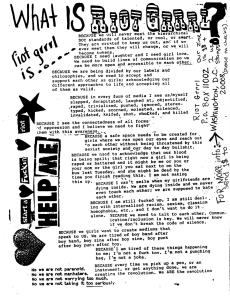“And this is my sound corner,” Sebby said proudly, as I looked amidst a small, crowded section of his dorm living room–piled high with music books, CDs, cassette tapes, recording equipment, numerous guitars, a keyboard, and countless empty bottles of Cherry Pepsi. This is Sebby’s work place, when not recording in the sound studio at The Theatre School.
Sebastian “Sebby” Woldt, 19, is a second year BFA Sound Design major at The Theatre School at DePaul University. A Chicago native, he had a privileged childhood living in the Near North Side, just a short walk away from Navy Pier.
“Theatre saved me. If it weren’t for theatre, I would not have made it through my sophomore year of high school.” Sebby went on to explain that, while his childhood proved wonderful, nothing good can stay and by the time he was fifteen things started to go awry. On top of the bullying from his tormentors at school, his parents separated, and subsequently got divorced: a hurt that will sting for years to come. Shortly after his parents’ separation, the adolescent Sebby experienced a Major Depressive episode; one which lasted nearly eleven months.
“I’m okay, really.” Sebby exclaimed, trying to convince himself as much as me. “I know now that the divorce was not my fault.” Spoken like a true, well-adjusted teenager, right?
They always tell you not to judge a book by its cover, and I tried not to judge Sebby by his external appearance, but his eclectic look and raggedy hair perfectly match his strange personality. Not everyone knows how to handle strangeness. Teachers and professors have suggested that he might have some form of Asperger’s. When Sebby mentioned this to his therapist (a man who he has been seeing weekly since age ten), he disagreed and replied to Sebby that he is “just a weird kid, who views the world through different lenses.”
Sebby does view the world through a different pair of eyes. Like many, he was raised Catholic and brought up in a household that spoke of an omni-powerful, smiting, God, and for many years he subscribed to Catholicism (even attended a Catholic grade school). But more recently, Sebby has explored differing views of religion, spirituality, and a higher power. Fascinated by the Ontological argument that God is necessary, and “that which no greater can be thought,” Sebby has challenged this with his own idea that God is “that which no more loving can be thought.” When I asked Sebby to give me an example of what this God looked like, he explained to me that when tragedy strikes, as it too often does, he does not see God in the senseless acts of violence, but rather the outpouring of love and support that follows such acts. For example, when 9/11 occurred, Sebby was distraught over what a horrible act of terror transpired, wondering where God was when the planes hit the towers. Upon further thought, Sebby decided to make the active choice to admire the countless service people who rushed to the scene, and look at their torrent of love as an ultimate act of God.
So Sebby’s therapist was right when he called him a “weird kid,” and Sebby himself is the first to admit it. As he described it, his brain is “a crescendo of weird bullshit,” and this persona begs the questions: does being slightly removed from normalcy and reality, grant you a vantage point from which you can view reality and represent it better than a well-adjusted person? Sebby’s eccentric view of the world has helped him to create works of art, in varying media, that a normal mind would never be able to construct. As his parents were working through a tumultuous divorce, Sebby threw himself into the one thing that was able to drown out the depression: creative writing. In a matter of months, his first novel was complete. Proud of his work, Sebby self-published and sold copies to the students at his school, and as we all know, kids are mean… especially to someone who breaks out of the shell society has placed them in. So, the tormenting got worse and Sebby’s depression felt all encompassing.
“I want to take you past my old high school,” Sebby pronounced adamantly during a late-night walk through Lincoln Park. “After all, it’s where my love for theatre all started.” So we’re walking down Fullerton Avenue, half-past eleven at night and Sebby tells me the story of his beginnings in theatre. Like many designers, he started out on stage, before becoming fascinated with the behind-the-scenes work. Exploring different characters on stage acted as a form of therapy, and helped Sebby work through a lot of his own problems.
“There is a difference between using art to solve your problems, and using art to solve problems in the greater community.” And while he started out attempting to make sense of his own personal life, he soon found that creating art for the latter purpose assisted in feeling better about his own.
Sound design fell into Sebby’s lap during his junior year of high school. He began composing music using computer software, and placed some of his work on social media sites and Youtube. Soon enough, one of his Youtube videos had over 200,000 views. Presently, his most popular Youtube hit titled “Rise of the Phoenix” has nearly 400,000 views with only 9 “dislikes” and over 1,500 “likes.” This is quite a feat for someone so young.
“I’m not One Direction and I don’t want to be, so 400,000 views is a lot for me.” At the café later that evening, Sebby told me about some of his other work that he has placed on Youtube in more recent months. His most recent piece, “Corday-Duperret Theme”, has over 20,000 views and rising, Sebby does not think this is much of an accomplishment.
Sebby’s root beer float arrived, as did my chocolate milkshake, and Sebby discussed the importance of a proper root beer float. “Finally, a good quality root beer. The Student Center’s MUG root beer just doesn’t do it for me. When I was younger, about nine or ten, I used to sneak into our refrigerator late at night and bring cans of root beer back to my room. I had a plastic bin that I stored them in under my bed, and I would have one, sometimes two, late at night when I couldn’t sleep.” His late-night soda habit continues to this day, as Sebby prefers working at nighttime. “I find I am most creative during the night hours. During the day, I’m just imaginative.”
“What exactly is the difference between imagination and creativity?” I asked.
“Well, imagination is the thoughts that ruminate in your head. They are all up here,” he said gesturing to his brain, “and have no physical substance to them. Creativity is when you take your imagination and make something with it.”
Sebby certainly is making something with it. Currently, he is the sound designer in the depths of the design process for The Phantom Toll Booth, a children’s theatre play which will perform this October through December at the Merle Reskin Theatre. Directed by David Catlin (of Lookingglass Theatre Company fame) this is an incredible opportunity for Sebby. He is gracefully rising to the challenge of this massive show, and composing a complete underscore to support the production. With many locations, moods, and emotions throughout this 75 minute play, Sebby has an exciting task ahead: to create a wide variety of music and sound that still remains cohesive throughout, and ultimately incorporates thematic elements of all the numerous locations into a single work.
On multiple occasions, Sebby has talked about the piece that he is most excited about working on. Pulling inspiration from Eric Whitacre, he is creating a song that is representative of a lullaby, titled “Wanderer Above the Sea of Fog,” written for a choir, cello, and piano. Over chicken fingers at the Student Center after class one day, he pulled out his computer and opened up the score to show me. He boasted that his friend in the School of Music told him that the cello part is playable, a task which becomes more challenging in the age of technology. With modern computers, a composer can create any collection of notes with the click of a button. The problem is when a musician goes to play the music that is physically impossible to play. With more experience composing, this is occurring less and less, a proud accomplishment for Sebby.
Back in his sound corner, where some of his most creative ideas have sparked, he sits drinking a Cheery Pepsi and riffing on a guitar. He talks of his plans to start a theatre company, to write an opera, to work as a Broadway sound designer, and to ultimately convey various realities on stage through the use of sound. Sebby comes from a privileged background, but even with the outward appearance of opportunity, there is great turmoil behind closed doors. Even so, his experience makes him who he is: imaginative and creative. His ability to see the world in a different light is what makes Sebby such an integral part of any production, and thus allowing his brilliant “crescendos of weird bullshit” to occur.


